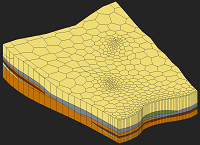GMS:Creating and Editing UGrids: Difference between revisions
From XMS Wiki
Jump to navigationJump to search
No edit summary |
|||
| Line 9: | Line 9: | ||
The following data types can be converted to UGrids by right-clicking on the object in the [[GMS:Project Explorer|Project Explorer]] and selecting the '''''Convert To > UGrid''''' command from the pop-up menu. | The following data types can be converted to UGrids by right-clicking on the object in the [[GMS:Project Explorer|Project Explorer]] and selecting the '''''Convert To > UGrid''''' command from the pop-up menu. | ||
*[[GMS:TIN Module|TINs]] | |||
*[[GMS:2D Grid Module|2D Grids]] | *[[GMS:2D Grid Module|2D Grids]] | ||
*[[GMS:3D Grid Module|3D Grids]] | *[[GMS:3D Grid Module|3D Grids]] | ||
